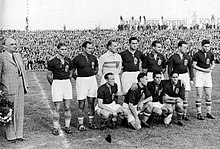This article is written like a story. (June 2024) |
 Hungarian team posing before the game on Warsaw's Stadion Wojska Polskiego | |||||||
| Event | Friendly | ||||||
|---|---|---|---|---|---|---|---|
| |||||||
| Date | 27 August 1939 | ||||||
| Venue | Stadion Wojska Polskiego, Warsaw | ||||||
| Referee | Esko K. Pekonen (Finland) | ||||||
| Attendance | 20,000 | ||||||
The Last Game, as it is known in Poland, was played on Sunday, 27 August 1939, at the Stadion Wojska Polskiego in Warsaw. It was the last game of the interwar Polish football team before the Second World War. The Poland national football team faced and beat one of the best teams of that period – FIFA World Cup (1938) runners-up, Hungary, four goals to two. This match has generally been forgotten by the Hungarians – for them it was just one of many international friendlies, without any significance. In Poland, however, it is still remembered as the last match before World War II and also because it was a victory over a renowned team – the biggest success in history of Polish football up to that time.
Four days before the match, the Germans and the Soviets had secretly signed the Molotov–Ribbentrop Pact, according to which Poland was to be wiped off the map of Europe. The perception in Warsaw was that something was up in the air, mobilization of the Polish Army was supposed to be announced at any time, but in spite of this people were hoping for the best, enjoying the weather and last days of summer vacation.[1]
In 1939, the Hungarian football team was widely regarded as one of the best in the world,[2] and hardly anyone in Poland believed that their players in white and red uniforms, their national colours, were going to win over their opponents. This opinion was echoed by the nation's largest sports daily Przegląd Sportowy, which in Saturday's issue exclaimed in large print on the front page, "Without chances, but ready to fight".[3] Poland was to face the Hungarians for the ninth time – up to then, the Poles had never won.[4]
A famous Scotsman Alex James, who in the summer of 1939 temporarily helped Józef Kałuża with training of Polish players,[5] had left Warsaw for Britain a few days earlier. It is likely he too felt that war was imminent and wanted to escape the country.[citation needed] James did not believe in Poland's victory, either. Just before the game, he sent three dispatches advising Poles to concentrate on defence and hope for a lucky draw.
- ^ N.S., 24 August 1939, ¶ "Jaki będzie wynik?".
- ^ N.S., 24 August 1939, ¶ "Na powitanie".
- ^ N.S., 24 August 1939, ¶ "Bez szans…".
- ^ N.S., 24 August 1939, ¶ "Historia 9 meczów…".
- ^ N.S., 24 August 1939, ¶ "Wielki wkład, mały skutek…".